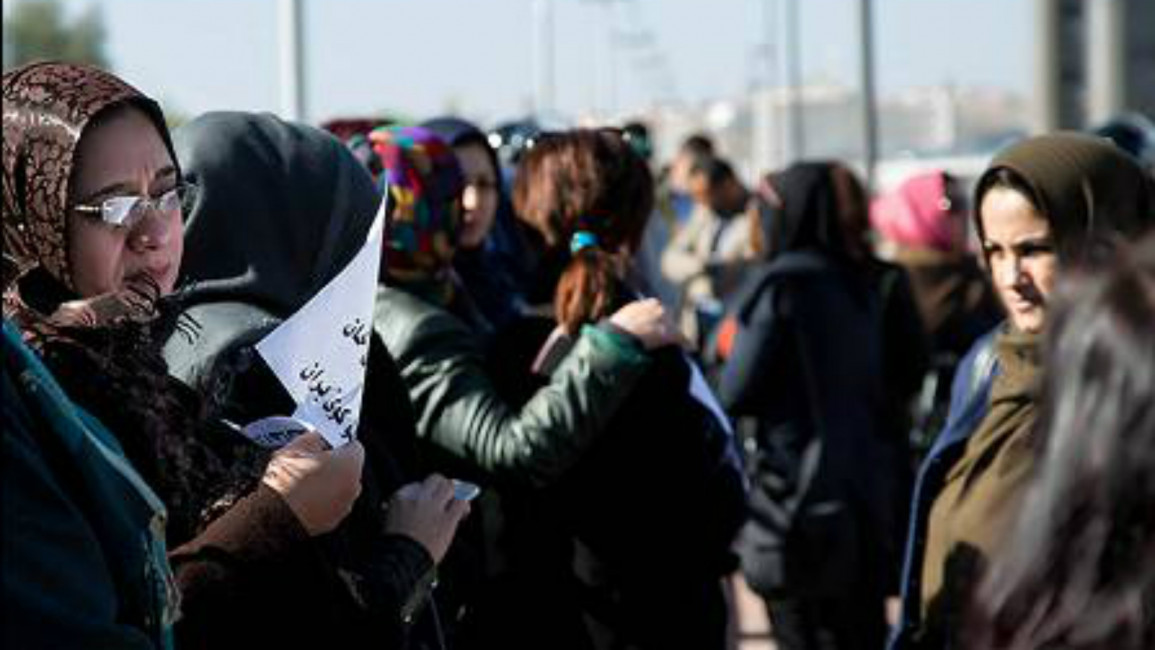Thousands of 'unpaid' teachers strike in Iraqi Kurdistan
Thousands of 'unpaid' teachers strike in Iraqi Kurdistan
After months of unpaid wages, thousands of teachers in Iraq's Kurdistan region are going on strike.
2 min read
A protest earlier this month against missed salary payments [twitter]
Thousands of teachers in Iraq's autonomous Kurdish region have gone on strike to protest months of unpaid wages, officials said on Saturday.
Iraqi Kurdistan has been hit hard by plummeting oil prices and is facing a financial crisis, and many of the regional government's employees have gone unpaid.
"The government did not pay any salary for the teachers of Kurdistan for four months," said Singar Faeq, the deputy head of the Kurdistan Teachers' Union in Sulaimaniyah province.
The strike was limited to Sulaimaniyah, where Faeq said 50,000 people took part.
"The strike will continue until the government responds to our demands to pay our salaries," said Ari Ahmed, the principle of a school in Sulaimaniyah.
Shorsh Ghafuri, an official from the Kurdish regional education ministry, said he could not provide a figure for the strikers, but that there were many.
Illustrating the scale of the financial problem, Ghafuri said that the regional government was still waiting for more cash to pay teachers their full salaries from last September.
The region's government, like Iraq as a whole, relies on oil sales to provide the vast majority of its funds, and has been hit hard by the sharp decline in crude prices, which have fallen below $30 per barrel.
But the Kurdistan government, which is independently exporting oil over Baghdad's strong objections, does not have the same access to loans and bond markets that will help keep Baghdad afloat.
The fall in oil prices comes as Iraqi forces, including Kurdistan's peshmerga fighters, wage a costly war against the Islamic State jihadist group, which overran large areas of the country in 2014.
Iraqi Kurdistan has been hit hard by plummeting oil prices and is facing a financial crisis, and many of the regional government's employees have gone unpaid.
"The government did not pay any salary for the teachers of Kurdistan for four months," said Singar Faeq, the deputy head of the Kurdistan Teachers' Union in Sulaimaniyah province.
The strike was limited to Sulaimaniyah, where Faeq said 50,000 people took part.
"The strike will continue until the government responds to our demands to pay our salaries," said Ari Ahmed, the principle of a school in Sulaimaniyah.
Shorsh Ghafuri, an official from the Kurdish regional education ministry, said he could not provide a figure for the strikers, but that there were many.
Illustrating the scale of the financial problem, Ghafuri said that the regional government was still waiting for more cash to pay teachers their full salaries from last September.
The region's government, like Iraq as a whole, relies on oil sales to provide the vast majority of its funds, and has been hit hard by the sharp decline in crude prices, which have fallen below $30 per barrel.
But the Kurdistan government, which is independently exporting oil over Baghdad's strong objections, does not have the same access to loans and bond markets that will help keep Baghdad afloat.
The fall in oil prices comes as Iraqi forces, including Kurdistan's peshmerga fighters, wage a costly war against the Islamic State jihadist group, which overran large areas of the country in 2014.


![President Pezeshkian has denounced Israel's attacks on Lebanon [Getty]](/sites/default/files/styles/image_684x385/public/2173482924.jpeg?h=a5f2f23a&itok=q3evVtko)



 Follow the Middle East's top stories in English at The New Arab on Google News
Follow the Middle East's top stories in English at The New Arab on Google News


